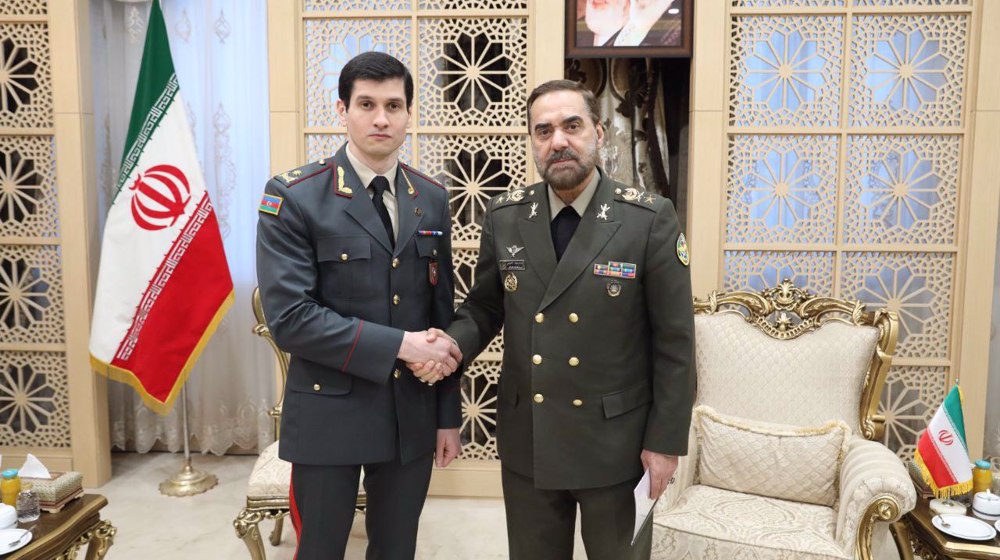Armenia threatens to recognize Karabakh as fresh fighting continues
Armenia has threatened to unilaterally recognize the independence of the disputed region of Nagorno-Karabakh if Azerbaijan refuses to comply with peace talks, as both sides continue to accuse each other of violating a humanitarian ceasefire amid reports of fresh fighting in and around Karabakh.
Armenian President Armen Sarkissian said on Sunday that Yerevan has so far refused to recognizes Karabakh independence, “only because it wants to resolve the problem through peace talks.”
“If there is light at the end of this tunnel, then we can go on,” Sarkissian said. “And if there is no light … Armenia will recognize Karabakh’s independence.”
Sarkissian also warned that “this war may grow into something that is going on in Syria. And it will be a much bigger and much more tragic war.”
Karabakh is internationally recognized as part of Azerbaijan, but it is held by ethnic Armenian separatists backed by Armenia since 1992, when they broke from Azerbaijan in a war that killed some 30,000 people.
The conflict re-erupted in late September, leading to the worst fighting in decades in the region.
Baku and Yerevan agreed to a "humanitarian ceasefire" on Saturday after a Russian-brokered truce fell apart, earlier.
The two sides, however, accuse each other of violating the latest truce.
Late on Sunday, the separatist government of Karabakh said it had recorded another 37 deaths among its forces. The latest casualties pushed the toll to 710, Russia’s Interfax news agency reported.
Explosions were heard near Karabakh’s main city, Stepanakert on Monday, Russia's Sputnik reported.
The unrecognized government accused Azerbaijan of resuming “missile and artillery shelling in the northern and southern directions," on Monday morning.
“The situation was relatively tense on the Artsakh-Azerbaijan line of contact during the night,” Armenia-backed forces said in a statement.
It also said that the forces had managed to repel Azerbaijan attacks.
Meanwhile, Azerbaijan Defense Ministry said Armenian forces had shelled its positions in the Garanboy, Terter and Aghdam regions overnight.
It said that the forces had also attacked the Agjebedin region on Monday morning.
Azeri authorities said shelling had also hit areas deep inside the country, increasing concerns about the security of pipelines that carry Azeri natural gas and oil to world markets. Armenia denied the allegation.
Azeri President Ilham Aliyev said earlier that the army had liberated several settlements in the south-western Jabrayil District, along the Nagorno-Karabakh line of contact.
"The armed forces of Azerbaijan have liberated the villages,” Aliyev wrote in a tweet on Monday.
He also accused Armenia of grossly violating the new ceasefire.
The failure to halt the weeks-long fighting has concerned UN chief Antonio Guterres, who called on both Yerevan and Baku to respect the ceasefire.
Guterres also denounced ongoing attacks on civilians in the battle in and around Karabakh.
His remarks came a day after a missile strike targeted houses in Azerbaijan’s second-largest city of Ganja, killing at least 13 people and injuring more than 40 in their sleep.
Following the attack, Aliyev accused Armenia of war crimes, but Yerevan denied that its forces had attacked Ganja’s residential area.
Armenia, instead, accused Baku of continuing to shell populated areas inside Karabakh.
Prime Minister Nikol Pashinyan also accused Baku of “an attempted genocide of the Armenian people.”
Armenia and Azerbaijan’s main foreign allies, namely Russia and Turkey, have called for the war to end.
Diplomat discourages recourse to pressure, intimidation, confrontation against Iran
UN: 2024 deadliest year for aid workers amid genocide in Gaza
Gaza health official warns of hospital shutdowns within 48 hours
Israel kills 5 more paramedics in southern Lebanon: Health ministry
Iran to launch ‘new, advanced’ centrifuges in response to IAEA resolution: AEOI
Yemen fires hypersonic missile at Israeli airbase
VIDEO | New Delhi chokes under toxic smog as air quality remains at hazardous levels
VIDEO | Press TV's news headlines















 This makes it easy to access the Press TV website
This makes it easy to access the Press TV website